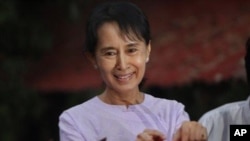Burmese democracy leader Aung San Suu Kyi was released from house arrest just over a week ago after being held for 15 of the last 21 years under some kind of detention. When she was first confined more than 20 years ago, it came, among other reasons, after an interview had aired that she had given with VOA's Bangkok correspondent at the time, David Dyar.
Mr. Dyar, who is still employed at the Voice of America, sat down to discuss his rememberances of those days and especially of the interview with Aung San Suu Kyi.
Carpenter: How did that interview come about and what was it about it that led to Aung San Suu Kyi's detention?
Dyar: The interview stemmed from a demonstration that was planned to mark the anniversary of her father's death, a fairly significant event in Burma of that time. The demonstration never took place because of what she perceived to be a crackdown by the military government. She made comments and issued statements about the tense situation at the time. I was in the Bangkok bureau and called Aung San Suu Kyi in Rangoon and asked her to comment and to describe what had happened. She said that the demonstration didn't take place but she had a lot of comments and descriptions of what the government was doing.
As it turned out, the next day she was placed under house arrest. The interview had aired the night of July 19 in the Burmese language and in English. What was surprising to me is that the Burmese government news accounts explaining why they arrested her mentioned the interview I did with her on the Voice of America.
Carpenter: What was it in that interview that so angered the military government?
Dyar: Well, according to their press reports it was her comments in which she called them a "fascist" government. I think if you read a little bit about the history of Burma her father's political party was, I think it was the Anti-fascist Liberation League, and so evidently that is a very serious charge to make against many of the senior military who had fought in World War II against the Japanese fascists.
Carpenter: You did this interview with the very famous political figure in Burma, and the next day, she's jailed for what she said to you. How did you feel about that?
Dyar: My first reaction was that maybe I said something or did something in my report that caused them to jail her. I felt very concerned that maybe I'm involved in this, somehow. But, when I studied what the Burmese government had said, it became clear that she knew exactly what she was saying and she obviously had some knowledge of the impact that that could have on her. So, that kind of relieved my own concern about myself, but it was still very instructive of what the limits are of how far she could push the government.




